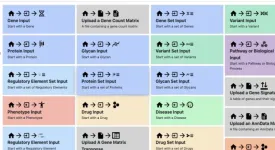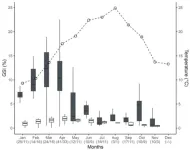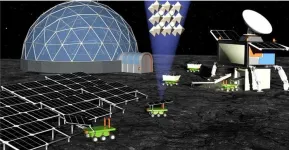(Press-News.org) Insects are the dominant form of animal life on our planet, providing humans and wildlife with pollination, food, and recycling services but, despite concerns about population declines, little is known about how 99% of species globally are faring.
A new approach is needed to better monitor species and protect them from the impacts of climate and land use change, pollution and invasive non-native species as soon as possible, according to a study led by the UK Centre for Ecology & Hydrology (UKCEH) and ZSL (Zoological Society of London).
The researchers, whose work has been published in the journal Science, point out there are one million known insect species globally but there have been IUCN assessments for just 1% –12,100 species, with around 20% of these considered threatened.
Monitoring is largely confined to butterflies, bumblebees and dragonflies in parts of Europe and North America, with little known about insects in parts of Asia and South America and virtually no data on species in Africa.
Incomplete picture
Despite reports of catastrophic insect declines, the study authors say the global state of insect biodiversity remains unclear due to the sheer complexity of insects’ lifestyles and fluctuating population trends, as well as a massive lack of data.
In their study, they propose a new framework for monitoring populations and analysing the impact of threats that integrates all available methods for studying insects. These are: comparing diversity and abundance over time and across different habitats, and through gathering expert opinion and carrying out experiments.
Dr Rob Cooke, an ecological modeller at UKCEH and joint lead author of the study, explained: “We need to find out whether insect declines are widespread and what’s causing them. The challenge is like a giant jigsaw puzzle where there are thousands of missing pieces, but we do not have decades to wait to fill these gaps and then act.
“There is a lot of interest in monitoring charismatic species such as bees and butterflies, but few people care about the supposedly unpleasant insects, even though they too provide benefits for us. For example, earwigs feed on aphids and other garden pests while cockroaches eat decaying material and keep soils healthy.”
Undervalued and understudied
Dr Charlotte Outhwaite of ZSL’s Institute of Zoology, joint lead author of the study, added: “Insects are an incredibly important part of our ecosystems, pollinating around 80% of flowering plant species and vital for 35% of global food production, yet they are undervalued and understudied.
“With a million described species it would take too long to figure what works best for each species. Instead we want to find large-scale actions that benefit the most insects. For this, we need to use all the available information we have.”
The study authors explain this means that, when there is a lack of data, experts would make judgments about how climate, land use, pollution or invasive non-native species are affecting certain species based on the known impacts on similar types of insects. Their proposed framework would integrate four types of research methods:
Time series trends, for example a decline in the number of butterflies over a 10-year period.
Spatial comparisons, such as looking at differences in species numbers or abundance across different habitats or regions.
Experiments to investigate the response of insects to different threats, such as comparing a field sprayed with pesticides to one without, or removing invasive non-native species from one area but not another.
Expert opinion on the response of insects to threats, for example, a scientist pointing out that butterfly counts tend to be higher in warmer rather than colder forests.
By combining data from a range of sources, scientists can gain a more complete picture of how insects respond to drivers of change while allowing transparency in uncertainty and data gaps.
The next step for the researchers is to implement their approach by using the range of research methods to model insect responses to key threats. Consolidating all available data will provide an updated overview of the state of the world's insect populations.
The work is part of a project funded by the Natural Environment Research Council (NERC), which is bringing together diverse sources of data including expert knowledge to assess the impact of individual threats.
The Global Insect Threat-Response Synthesis (GLiTRS) project involves UKCEH, the Natural History Museum, University College London, the Zoological Society of London, the University of Cambridge, Queen Mary University of London, the University of Stellenbosch, the University of Reading, the University of Exeter and Imperial College London.
- Ends -
Media enquiries
For interviews and further information, please contact Simon Williams, Media Relations Officer at UKCEH, via simwil@ceh.ac.uk or +44 (0)7920 295384.
Notes to Editors
Paper information
Cooke, Outhwaite et al. 2025. Integrating multiple evidence streams to understand insect biodiversity change. Science. DOI: 10.1126/science.adq2110
About the UK Centre for Ecology & Hydrology (UKCEH)
The UK Centre for Ecology & Hydrology (UKCEH) is a leading independent research institute dedicated to understanding and transforming how we interact with the natural world.
With over 600 researchers, we tackle the urgent environmental challenges of our time, such as climate change and biodiversity loss. Our evidence-based insights empower governments, businesses, and communities to make informed decisions, shaping a future where both nature and people thrive.
ceh.ac.uk / BlueSky: @ukceh.bsky.social / LinkedIn: UK Centre for Ecology & Hydrology
About ZSL
We’re ZSL, a science-driven conservation charity working to restore wildlife in the UK and around the world. We work to help wildlife and people thrive together. Guided by a scientific approach and passion for nature, we lead conservation, shape agendas and influence change to protect and restore nature. We are committed to protecting species, restoring habitats, training conservationists and creating change for nature.
Visit www.zsl.org for more information.
END
‘Some insects are declining but what’s happening to the other 99%?’
Despite fears over ‘insectageddon’, there is a lack of data about virtually all insect species globally, so a research rethink is needed
2025-04-03
ELSE PRESS RELEASES FROM THIS DATE:
Powerful new software platform could reshape biomedical research by making data analysis more accessible
2025-04-03
New York, NY [April 3, 2025]— A powerful new software platform called the Playbook Workflow Builder is set to transform biomedical research by allowing scientists to conduct complex and customized data analyses without advanced programming skills. An article that describes the new platform was published in the April 3 online issue of the journal PLOS Computational Biology.
Developed by a multi-institutional team that was led by Icahn School of Medicine at Mount Sinai investigators as part of the National Institutes of Health Common Fund Data ...
Revealing capillaries and cells in living organs with ultrasound
2025-04-03
Ultrasound is one of the most widely used imaging techniques in medicine, but up until recently it hardly played a role in imaging the tiniest structures of our bodies such as cells. “Clinical ultrasound, like the kind used for pregnancy scans, creates real-time images of body parts”, first author Baptiste Heiles explains. “It allows diagnosis of various diseases, or to monitor a developing baby. However, what is going on at a microscopic level remains hidden.”
Imaging living cells in 3D
Now, a team of scientists from TU Delft, the Netherlands Institute for Neuroscience and Caltech managed to image specifically ...
American College of Physicians awards $260,000 in grants to address equity challenges in obesity care
2025-04-03
PHILADELPHIA, April 3, 2025 – Today, the American College of Physicians (ACP) announced that it has awarded a total of $260,000 in grants to support regional programs that address equity challenges in obesity care. Thirteen grantees were each awarded $20,000 to implement collaborative regional outreach projects.
Through “Advancing Equitable Obesity Care through Regional Action Grants,” ACP aims to inspire local collaboration models across the country to train and empower medical professionals to partner with patients to combat misinformation and heighten clinical capacity to manage care for people with obesity. The program capitalizes ...
Researchers from MARE ULisboa discover that the European catfish, an invasive species in Portugal, has a prolonged breeding season, enhancing its invasive potential
2025-04-03
The European Catfish is the largest freshwater fish in Europe, reaching up to 2.8 meters in length and 130 kg in weight. It was first detected in Portugal in 2014. As a top predator, it has no natural enemies and exhibits high fecundity, with females capable of producing up to half a million oocytes (unfertilized eggs). “This is not new information, as this invasive species reaches large sizes, and there is a direct relationship between abdominal cavity volume and the total number of oocytes produced,” said Christos Gkenas, a researcher at MARE-ULisboa and the study’s lead author. ...
Rakesh K. Jain, PhD, FAACR, honored with the 2025 AACR Award for Lifetime Achievement in Cancer Research
2025-04-03
CHICAGO – The 2025 AACR Award for Lifetime Achievement in Cancer Research will be presented to Rakesh K. Jain, PhD, Fellow of the AACR Academy, during the AACR Annual Meeting 2025, to be held April 25-30 at the McCormick Place Convention Center in Chicago, Illinois.
Jain is the director of the Edwin L. Steele Laboratories for Tumor Biology in the Department of Radiation Oncology at Massachusetts General Hospital and the Andrew Werk Cook Professor of Radiation Oncology (Tumor Biology) at Harvard ...
Solar cells made of moon dust could power future space exploration
2025-04-03
The same dirt that clings to astronauts’ boots may one day keep their lights on. In a study publishing April 3 in the Cell Press journal Device, researchers created solar cells made out of simulated Moon dust. The cells convert sunlight into energy efficiently, withstand radiation damage, and mitigate the need for transporting heavy materials into space, offering a potential solution to one of space exploration's biggest challenges: reliable energy sources.
“The solar cells used in space now ...
Deporting immigrants may further shrink the health care workforce
2025-04-03
About The Study: More than 1 million noncitizen immigrants (one-third of them undocumented) work in health care in the U.S. Their ranks include skilled personnel who would be difficult to replace, especially if legal immigration is further restricted. Many health care workers may be removed if President Trump implements plans to deport undocumented immigrants and those losing temporary protected status (e.g., from Haiti and Venezuela).
Corresponding Author: To contact the corresponding author, Lenore S. Azaroff, MD, ScD, email Lenore_Azaroff@yahoo.com.
To ...
Border region emergency medical services in migrant emergency care
2025-04-03
About The Study: The findings of this qualitative study of emergency medical services (EMS) clinicians suggest that migration has a complex, multidimensional influence on EMS clinicians in the border region. Deterrence-focused actions have not decreased the number of crossings but rather pushed migrants to cross in more dangerous ways, leading to more injuries and deaths. The findings suggest that the strain placed on local EMS clinicians is unsustainable and may be exacerbated by increased deterrence-based policies. Instead, border-region EMS clinicians need increased federal funding to support their work.
Corresponding Author: To contact the corresponding ...
Resident physician intentions regarding unionization
2025-04-03
About The Study: In this survey study, most resident physicians reported either being in a union or supporting unionization at their institution, citing pay and financial security as critical factors in their consideration of unionization. Future research should investigate other factors and whether unionization achieves its goals of increased pay and benefits, work hours, and well-being.
Corresponding Author: To contact the corresponding author, Laura K. Barger, PhD, email lkbarger@hms.harvard.edu.
To access the embargoed study: Visit our For The Media ...
Healthy nutrition and physical lifestyle choices lower cancer mortality risk for survivors, new ACS study finds
2025-04-03
In 2022, the American Cancer Society (ACS) updated its nutrition and activity guidelines for cancer survivors, recommending they avoid obesity, stay physically active, eat a healthy diet, and limit alcohol intake. New research by ACS scientists shows a lifestyle aligned with these guidelines is associated with a lower mortality risk among non-smoking survivors of obesity-related cancers in the United States. Survivors who maintained a healthy lifestyle both before and after their diagnosis — or those who improved their habits after diagnosis — also had a lower mortality risk. The study is out today in the Journal of the National ...
LAST 30 PRESS RELEASES:
Spiritual practices strongly associated with reduced risk for hazardous alcohol and drug use
Novel vaccine protects against C. diff disease and recurrence
An “electrical” circadian clock balances growth between shoots and roots
Largest study of rare skin cancer in Mexican patients shows its more complex than previously thought
Colonists dredged away Sydney’s natural oyster reefs. Now science knows how best to restore them.
Joint and independent associations of gestational diabetes and depression with childhood obesity
Spirituality and harmful or hazardous alcohol and other drug use
New plastic material could solve energy storage challenge, researchers report
Mapping protein production in brain cells yields new insights for brain disease
Exposing a hidden anchor for HIV replication
Can Europe be climate-neutral by 2050? New monitor tracks the pace of the energy transition
Major heart attack study reveals ‘survival paradox’: Frail men at higher risk of death than women despite better treatment
Medicare patients get different stroke care depending on plan, analysis reveals
Polyploidy-induced senescence may drive aging, tissue repair, and cancer risk
Study shows that treating patients with lifestyle medicine may help reduce clinician burnout
Experimental and numerical framework for acoustic streaming prediction in mid-air phased arrays
Ancestral motif enables broad DNA binding by NIN, a master regulator of rhizobial symbiosis
Macrophage immune cells need constant reminders to retain memories of prior infections
Ultra-endurance running may accelerate aging and breakdown of red blood cells
Ancient mind-body practice proven to lower blood pressure in clinical trial
SwRI to create advanced Product Lifecycle Management system for the Air Force
Natural selection operates on multiple levels, comprehensive review of scientific studies shows
Developing a national research program on liquid metals for fusion
AI-powered ECG could help guide lifelong heart monitoring for patients with repaired tetralogy of fallot
Global shark bites return to average in 2025, with a smaller proportion in the United States
Millions are unaware of heart risks that don’t start in the heart
What freezing plants in blocks of ice can tell us about the future of Svalbard’s plant communities
A new vascularized tissueoid-on-a-chip model for liver regeneration and transplant rejection
Augmented reality menus may help restaurants attract more customers, improve brand perceptions
Power grids to epidemics: study shows small patterns trigger systemic failures
[Press-News.org] ‘Some insects are declining but what’s happening to the other 99%?’Despite fears over ‘insectageddon’, there is a lack of data about virtually all insect species globally, so a research rethink is needed



